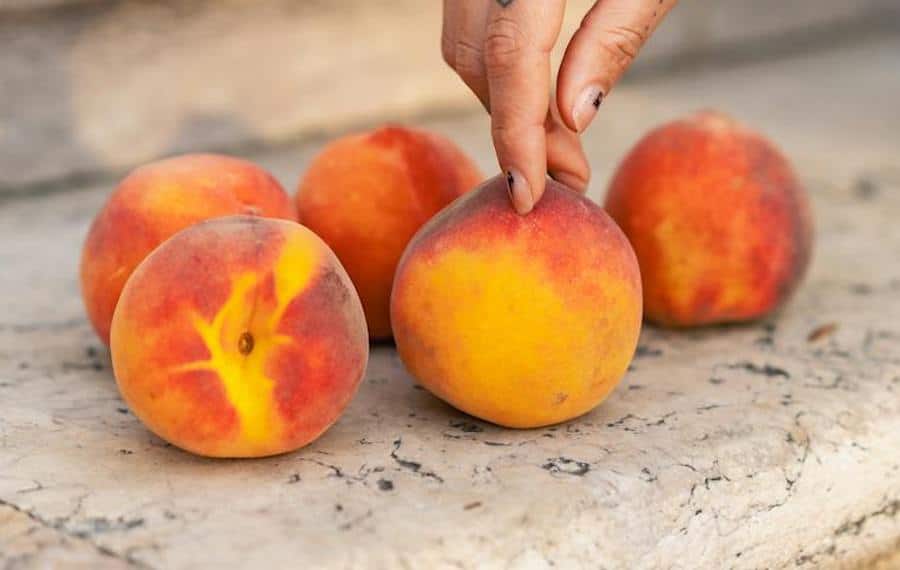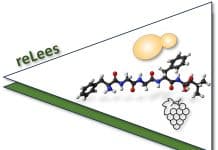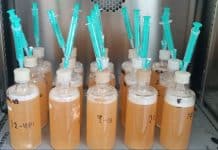 Peaches are popular fruits due to their nutritional value, acceptable sugar to acid ratio and pleasant taste. Peaches have a short storage time, less than 7 days at ambient temperature, resulting in rapid ripening and deterioration. To extend the shelf life of the fruit, cold storage is usually used, which delays ripening. A common problem of cold storage is the occurrence of chilling injury (CI), which manifests itself as a loss of taste-smell and the ability to ripen, increased frequency of deterioration, internal browning, flesh disintegration, lack of juice and finally a reddish hue of the flesh. CI is influenced by genetic factors, the internal structure of the mesocarp, the phenotype, the combination of
Peaches are popular fruits due to their nutritional value, acceptable sugar to acid ratio and pleasant taste. Peaches have a short storage time, less than 7 days at ambient temperature, resulting in rapid ripening and deterioration. To extend the shelf life of the fruit, cold storage is usually used, which delays ripening. A common problem of cold storage is the occurrence of chilling injury (CI), which manifests itself as a loss of taste-smell and the ability to ripen, increased frequency of deterioration, internal browning, flesh disintegration, lack of juice and finally a reddish hue of the flesh. CI is influenced by genetic factors, the internal structure of the mesocarp, the phenotype, the combination of  temperature/storage time. Many Pella peach varieties are subject to the aforementioned disorders. The condition of the fruit after the effect of CI determines the possibility of storage/handling after harvest, limits the distribution radius and reduces consumer acceptance. The decrease in the marketing of peaches is due to the low organoleptic quality (taste, texture), due to the acceleration of the harvest, before the appropriate ripening of the fruit. It is considered essential to determine and ensure the appropriate harvest stage for high quality peaches. Equally crucial for the final quality of peaches are post-harvest factors, the conditions during the preservation and transportation of peaches (temperature, relative humidity, composition of the preservation atmosphere and the presence or absence of ethylene), combined with the sorting and packaging conditions. OptiPeach project will develop and optimize innovative post-harvest handling processes in order to extent the products shelf life.
temperature/storage time. Many Pella peach varieties are subject to the aforementioned disorders. The condition of the fruit after the effect of CI determines the possibility of storage/handling after harvest, limits the distribution radius and reduces consumer acceptance. The decrease in the marketing of peaches is due to the low organoleptic quality (taste, texture), due to the acceleration of the harvest, before the appropriate ripening of the fruit. It is considered essential to determine and ensure the appropriate harvest stage for high quality peaches. Equally crucial for the final quality of peaches are post-harvest factors, the conditions during the preservation and transportation of peaches (temperature, relative humidity, composition of the preservation atmosphere and the presence or absence of ethylene), combined with the sorting and packaging conditions. OptiPeach project will develop and optimize innovative post-harvest handling processes in order to extent the products shelf life.
Project Τitle: Optimization of the quality of peach and nectarines through the application of innovative post-harvest handling
Project Duration: 14/12/2022- 31/05/2025 (30 months)
Project Framework & Funding: Metro 16 – Ypometro 16.1 – 16.2 “ESTABLISHMENT AND OPERATION OF OPERATIONAL GROUPS OF THE EUROPEAN INNOVATION PARTNERSHIP FOR AGRICULTURAL PRODUCTIVITY AND SUSTAINABILITY”, Ministry of Rural Development and Food – Total Budget: 145.000€, Uniwa Budget: 32.577,58€
Scientific coordinator (UNIWA): Andriana E. Lazou
Consortium – Partners: Gardigiotis Dim. Menelaos, Kalyvia Agricultural Cooperative, Special Account for Research Grants, University of West Attica – Laboratory of Chemistry, Analysis and Design of Food Processes












